☆ PuniPuni Youtube ☆
Japanese Grammar Lesson 6: The Particle も (mo) – Review Notes
Today we learned about the Japanese particle も (mo). We learned that も is similar to the English words “too” or “also.” In this review we will go over the concepts from the video and see some more examples and uses.
………………………………………………………………………………..
The Japanese Particle も (mo)
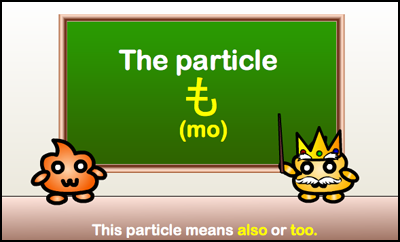
★ The Japanese particle も means also or too.
★ 私も!(Watashi mo!) means Me too!
★ To make it more formal, just add です (desu) to the end!
私もです!
Watashi mo desu!
Me too!
………………………………………………………………………………..
Showing similarities using も (mo)
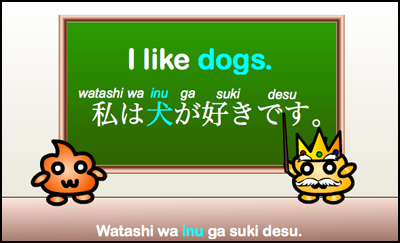
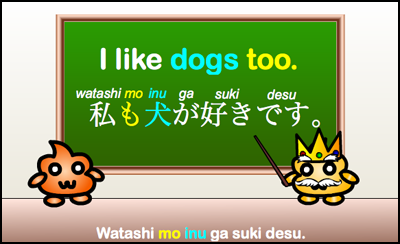
★ In this example, you are talking with your friend about your favorite animals. Your friend says:
私は犬が好きです。
watashi wa inu ga suki desu.
I like dogs.
★ You like dogs too, so you say:
私も犬が好きです。
watashi mo inu ga suki desu.
I like dogs too.
★ By replacing the particle は (wa) from the first sentence with the particle も (mo), it gives the meaning of too.
………………………………………………………………………………..
Showing lack of preference using も (mo)
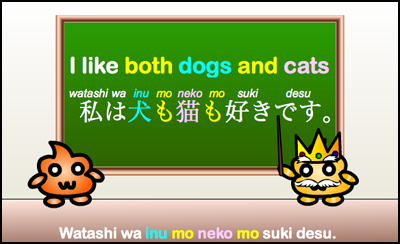
私は犬も猫も好きです。
watashi wa inu mo neko mo suki desu.
I like both dogs and cats
★ This means that I like both dogs and cats equally, without any preference for one over the other.
………………………………………………………………………………..
Example 1:
私は肉も野菜も好きです。
Watashi wa niku mo yasai mo suki desu.
I like both meat and vegetables (equally).
………………………………………………………………………………..
Example 2:
あなたもアメリカ人ですか。
Anata mo Amerikajin desu ka?
Are you American too?
………………………………………………………………………………..
Example 3:
コーヒーが好きです。お茶も好きです。
Kōhī ga suki desu. Ocha mo suki desu.
I like coffee. I also like tea.
………………………………………………………………………………..
Conclusion:
Today we learned about the Japanese particle も (mo). も can be used to express agreement or similarity. It means too or also. It can also be used to express a lack of preference, such as
私は犬も猫も好きです
watashi wa inu mo neko mo suki desu
I like both dogs and cats (equally).
………………………………………………………………………………..
Get Japanese dictionary!
Do you want to know a lot of Japanese words? I recommend you to get a dictionary!
If you have dictionary, you can always look up new Japanese words\(◕ω◕)/♥
………………………………………………………………………………..
Do you want a Japanese tutor?
Take Japanese Skype Lessons with Professional Japanese Teachers on kakehashijapan.com!
………………………………………………………………………………..
………………………………………………………………………………..










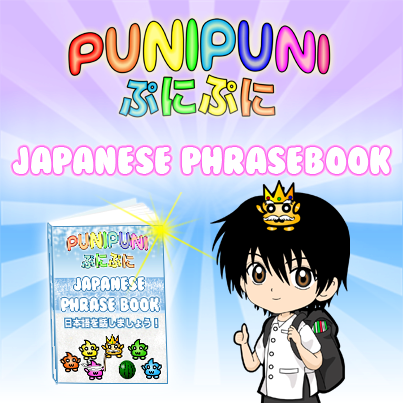

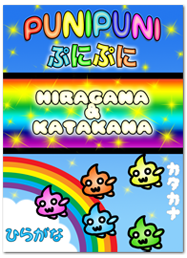
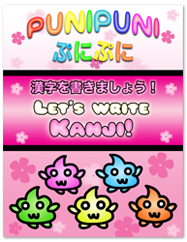


22 comments
コーヒーが好きです。お茶も好きです。
Comment by Alex on 10/22/2012 at 9:42 pmIs it possible to just say お茶も好き and leave out the です ?
Also, would just saying お茶も work too, since in the first sentence you already established that you were talking about things you liked?
Sorry if that was a little confusing.. :B
Thanks, ぷにぷに!
Yes! You can leave off the です and just say お茶も好き but it will become a casual sentence. However, leaving off 好き and just saying お茶も does not work. Generally, you can leave off the topic of a sentence. For instance, you can shorten 私はアメリカ人です。to just アメリカ人です。However, that doesn’t work for verbs or adjectives which come at the end of the sentence. So, your best options would be either お茶も好きです。for a formal sentence or お茶も好き。for a casual sentence(◕ω◕)♪
Comment by PuniPuni on 10/22/2012 at 10:39 pmIf I wanted to say “he likes dogs” could I say “かれは犬がすきです” ?
Comment by MyCool on 05/07/2013 at 6:24 pmはい!It is correct! \(◕ω◕)/♪ If you wanted to use all kanji, you could also write it like this: 彼は犬が好きです。
Comment by PuniPuni on 05/08/2013 at 8:08 amHi, can you use も three times (or more) in a sentence? For instance, りんごもバナナもグレープも全部好きです。
Comment by Sira on 12/14/2013 at 2:30 amIs that correct? Or is there a better way to list three or more things in this way?
どうもありがとう! ぷにぷにさんの説明はいつも分かりやすいです!
Yes, that is correct! You can use も as many times in a sentence as you want! (>ω<)♡ うれしい!ありがとう♪
Comment by PuniPuni on 12/19/2013 at 3:27 amDoes ‘watashi wa okaasan to kohi mo ga suki desu,’ make sense?
Comment by Dee on 01/29/2014 at 4:14 pmIf not, how would I say it?
Are you trying to say “me and my mother both like coffee”? If so, you can say “watashi mo okaasan mo kōhī ga suki desu.” (◕ω<)♪
Comment by PuniPuni on 01/31/2014 at 7:35 pmhello!
Comment by jessa on 02/04/2014 at 11:50 amis this correct,
“Anata mo kohi ga suki desu ka?”
If I want to say “do you like coffee too?”
Yes! That’s correct! (◕ω<)♪
Comment by PuniPuni on 02/09/2014 at 5:36 pmIs the sentence アメリカに行っても grammatically correct.
Comment by kekeke on 03/16/2014 at 12:33 amIt’s not a complete sentence. (◕ω◕)☆ It roughly translates to: “Even if (you) went to America…” It sounds like something should come after this. What did you want to say?
Comment by PuniPuni on 03/17/2014 at 7:17 amIf I only want to answer with “Me too”, can I just say “Watashi mo”? For example if someone says “Neko ga suki desu” and I want to say “Me too” is it grammatically correct to say “Watashi mo”?
Comment by marta on 04/06/2014 at 5:45 amYes! You can certainly say that! \(◕ω◕)/♥
Comment by PuniPuni on 04/10/2014 at 9:21 amHello
Is there a difference between these two sentences?
Comment by paul on 06/13/2014 at 12:27 amジョンもキムもいる。
ジョンとキムもいる。
It’s almost the same. It’s really hard to explain the difference because it is so minor… It’s like:
ジョンもキムもいる。 – Both John and Kim are there/here.
ジョンとキムもいる。 – John and Kim are there/here.
I guess using two も’s makes it more emphasized that they are both there.
Comment by PuniPuni on 06/21/2014 at 6:29 amWhy does the sentence sometimes have か and sometimes が? Is it because it’s plural?
Comment by Larissa on 10/04/2014 at 6:47 pmWhich sentence are you talking about? I am not sure where you are having confusion. か and が are both particles, but their function is very different. It has nothing to do with anything being plural (there is no plural tense in Japanese). The particle か can be used at the end of a sentence to mark it as a question. The particle が can be used to mark the subject of the sentence.
Comment by PuniPuni on 10/22/2014 at 7:14 amI notice that some sentences have a が and other sentences don’t. When stating one interest, it has a が and when stating multiple interest it doesn’t have a が.
Comment by Latsona on 11/09/2014 at 6:31 pmIs the reason why this sentence have a が “watashi mo inu ga suki desu.”, have to deal with keeping a particular between the verb and noun?
This sentence doesn’t have a ga “watashi wa inu mo neko mo suki desu.”
The reason that the second sentence you mentioned doesn’t have the particle “ga” is because it has been replaced by the particle “mo.”
Another example of this is if you said: “Neko ga suki desu. Inu mo suki desu.” (“I like cats. I also like dogs.”) In sentences where you use the particle “mo” after the subject (in this case “inu” (dogs) is the subject), the particle “ga” is omitted. Does this make sense?
“ga” is the subject marking particle, but it can be replaced by the particle “mo” in some sentences. They will never be used alongside
Comment by PuniPuni on 11/25/2014 at 4:16 am(inu ga mo suki desu).Hello.
For “Good morning to you too.”
are these correct?
あなたにもおはよう。
あなたにもおはようございます。
Thanks in advance.
Comment by daniel on 01/04/2015 at 11:45 pmIn Japanese, we don’t say like this. If someone says おはよう to you, you should respond with おはよう. If someone says おはようございます to you, you should respond with おはようございます. It’s much simpler than English, don’t you think? (◕ω<)
Comment by PuniPuni on 01/06/2015 at 7:37 am